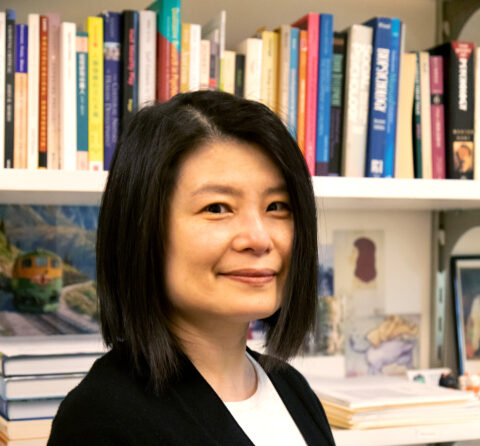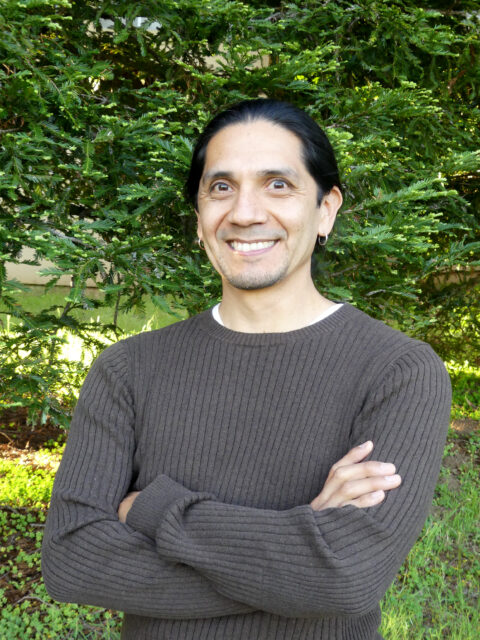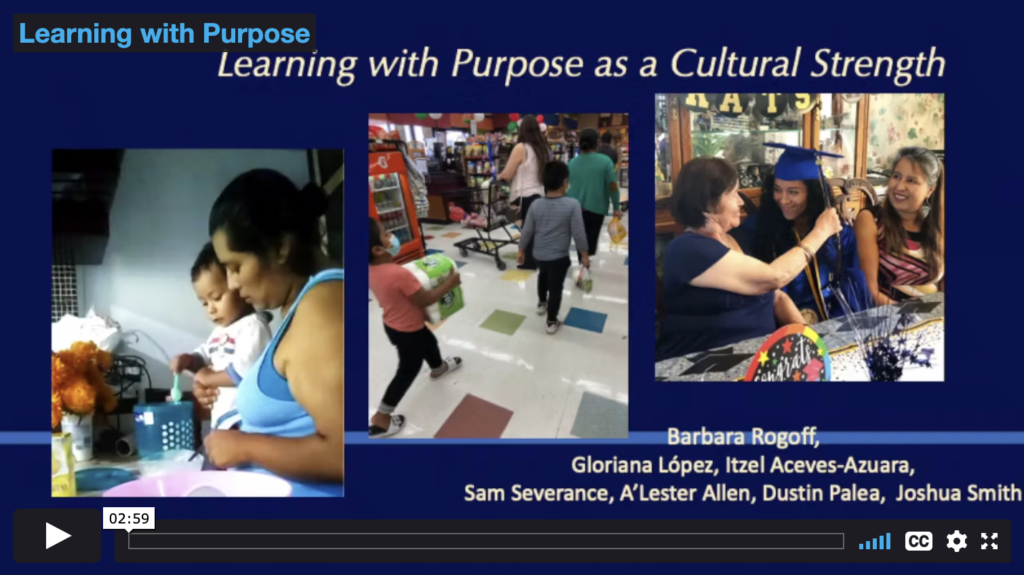Above: New Gen Learning’s investigations have touched on a wide variety of areas, including the effects on learning during the COVID-19 pandemic, the importance of having a purpose for learning, and the strengths of having a culturally and linguistically diverse background. (Photo by andresr Getty Images)
It’s easy to identify the difficulties low-income and minoritized students face in pursuing their academic goals. But what about also identifying their often-overlooked strengths?
That’s the focus of UC Santa Cruz’s New Gen Learning, an interdisciplinary research consortium. The group, now in its third year, puts faculty members and graduate students from various fields together to highlight the learning strengths of underserved children and students.

Su-hua Wang, psychology professor and the director of New Gen Learning | Photo by Carolyn Lagattuta
The consortium asserts that ideas about learning for children and students from historically underserved backgrounds have often been based on assumptions, values, and research with middle-class European American groups. Research and practice often overlook or even undermine the strengths that children and students from underserved backgrounds bring to learning, and instead use a deficit perspective. Learning opportunities for these populations are often insufficient or inappropriate due to a complex set of individual, social, cultural, and structural approaches to learning and instruction.
The group’s investigations have touched on a wide variety of areas, including the effects on learning during the COVID-19 pandemic, the importance of having a purpose for learning, and the strengths of having a culturally and linguistically diverse background.
Along the way, the consortium has provided much-needed opportunities for graduate students to receive mentoring from experienced faculty members about how to make a career in academia. All participants have been able to interact with people in different fields than their own, something that doesn’t always happen easily. Participants have come from the social sciences, physical and biological sciences, engineering, arts, and humanities, all collaborating on studies that promote inclusive learning.
Learning in a pandemic
Over the three years, 32 graduate students, 75 percent of whom come from marginalized backgrounds, have participated. The students have appreciated the experience, even with the huge disruption of the COVID-19 pandemic, which moved the group’s work online. The consortium continued to meet regularly on Zoom, with some members saying they looked forward to the sessions during this difficult time for the much-needed human interaction.
Some participants turned their attention to investigating the effects of the pandemic on learning.
As one example, Wang collaborated with Rebecca Covarrubias, an associate professor of psychology, and doctoral student Samantha Basch (developmental psychology) to survey 15 UC Santa Cruz seniors from minoritized backgrounds about how they experienced remote learning during the pandemic.
Everybody had a rough first year of COVID, starting with the power outages in fall 2019—the result of PG&E’s decision to shut off power to millions of Californians in the face of wildfire risk from hot, dry weather and gusty winds; the graduate students’ strike in the winter; the pandemic stay-at-home orders; and the August 2020 CZU Lightning Complex fire, which forced more than 70,000 people, including everyone on the UC Santa Cruz campus, to evacuate.
The wild ride created opportunities for “students to humanize instructors as they went through the challenges together and as instructors made efforts to build classroom community, including intentionally discussing their own experiences with the pandemic,” said the brief on the research. One student surveyed reported that she was more likely to complete weekly quizzes because she appreciated how hard her professor was working.
Students also reported enjoying the flexibility of being able to view course materials on their own time. A student was able to take care of young family members and then watch a recorded lecture at a more convenient time.
While it was difficult for some students to find space to work in houses with other family members, who were also working from home, they said they were ultimately able to figure it out. Through good communication, family members were able to find time to get their work done.
Researchers Wang, Covarrubias, and Basch concluded that teachers sharing their personal experiences helps build community in a class. They also said teachers could consider encouraging students to use their families as a resource for assignments as a way to help alleviate tensions that come from sharing home and school space. Involving families who support the students’ education may provide students with a sense of purpose for remaining in school.
Learning with purpose
The importance of learning with purpose was the focus of a video created by New Gen Learning codirector Barbara Rogoff, a psychology professor, and six other members of the consortium. The three-minute video won two awards in the National Science Foundation’s Video Showcase competition in the Public Choice and Most Discussed categories.
Rogoff says in the video that in many schools, the only purpose for learning is for individual performance. That doesn’t provide enough reason for many students to be motivated for their studies. By contrast, working to benefit a community can fuel students’ efforts.
“Benefitting a group is a powerful motivator, especially for community-minded people who value having a purpose larger than oneself,” said Rogoff in the video.
The video points out that even the smallest children want to help out at home. Children from Mexican and Indigenous heritage communities often use their own initiative to help and align their efforts with the needs of a group. This often results in a sophisticated collaboration with little conflict, the video said.
The video was compiled in part from Zoom discussions New Gen Learning members had. Rogoff said a wonderful part of the experience was that many people of color were involved as coauthors and that they came from diverse fields, ranging from ocean science to psychology.
Dismantling deficit narratives
A similarly diverse group also collaborated to write the paper, “Dismantling Persistent Deficit Narratives about the Language and Literacy of Culturally and Linguistically Minoritized Children and Youth: Counter-Possibilities” for the journal Frontiers in Education.
Nora Lang, a doctoral student at the time (Ph.D. ’21, education), was one of seven New Gen Learning participants, including Wang, Basch, and Salvador Huitzilopochtli, to work on the paper.
The paper criticizes the common ideas that children from low-income families may have a “word gap” when compared to their white middle-class peers and that students need to develop an “academic language” to engage in high-level learning.
A 1995 study claimed that a group of young children in low-income families heard fewer words than a group of children in middle-class families. According to the New Gen Learning paper, this study is still cited as a reason for big achievement gaps in low-income children.
The study focused on words a parent said directly to a child but discounts words the child overhears in a group, the New Gen Learning paper said. Moreover, a 2005 study showed that working-class families can have rich storytelling practices filled with emotion and different perspectives. The New Gen Learning authors said that such strengths are obscured with research that highlights language practices commonly associated with white middle-class parenting.
Lang has enjoyed being a part of New Gen Learning because it provided a place for the participants’ own learning. Though the group has produced research and reports, that is not the only goal.
“It feels less about performance and more about genuinely engaging,” she said. All participants are encouraged to share freely about what they’ve learned and what questions they still have.
When the COVID-19 pandemic hit, members of the consortium felt comfortable enough with each other to share the challenges they were having. “We could be vulnerable and share ideas, worries, and rage,” she said.
The conversations Lang had with New Gen Learning (NGL) participants helped her get through that tough time while she was mostly at home focused on finishing her dissertation.
Lang—currently an NGL postdoc and UCSC lecturer—is now searching for a faculty job in education and hopes to find similar opportunities for collaborative research and discussion.
Building children’s and students’ well-being and learning

Salvador Huitzilopochtli, a New Gen Learning participant (M.A. ’18, education) and doctoral candidate in mathematics education (’22), is working to help middle school students learn algebra. | Photo by Linnea Beckett
Salvador Huitzilopochtli, a New Gen Learning participant (M.A. ’18, education) and doctoral candidate in mathematics education (’22), said he appreciated getting a couple of quarters of funding from working with the consortium.
New Gen Learning’s mission to uncover strengths and assets of underserved students is important to his work in helping middle school students learn algebra. Huitzilopochtli has found in his work that middle school students can be creative in coming up with their own ways to understand math if given a chance.
He recalls one 13-year-old student making a compelling argument using a drawing of playing cards to explain how any five numbers could be divisible by five.
“It’s not a perfect mathematical proof,” Huitzilopochtli said. “Usually, people don’t take a proof class until university. But the ‘proof’ that he did was really good.”
Huitzilopochtli explained that this is important because good mathematics education starts with a conceptual understanding. Students might forget the formula of how to solve a problem but will understand the concept.
“Some meaning is attached to it and they can go back to that meaning,” he explained.
All the research New Gen Learning has contributed is designed to highlight such strengths to help children’s and students’—including graduate students’—well-being and learning.
Cynthia Lewis, another New Gen codirector and professor and chair of education, said New Gen Learning is a great way to help graduate students learn the ins and outs of making a career in academia.
“It offers mentorship, support, and training all in one and is a pathway for many NGL student researchers who are first generation and students of color,” Lewis said.


